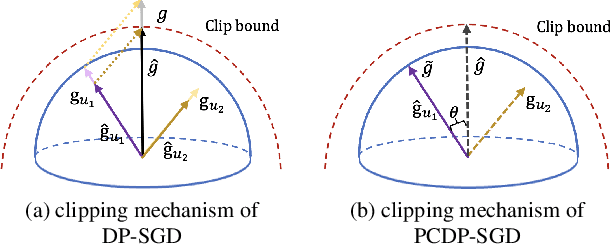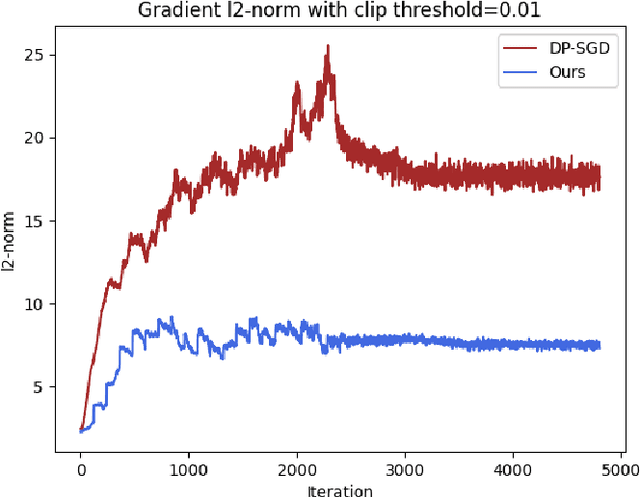Haichao Sha
Renmin University of China
Clip Body and Tail Separately: High Probability Guarantees for DPSGD with Heavy Tails
May 27, 2024Abstract:Differentially Private Stochastic Gradient Descent (DPSGD) is widely utilized to preserve training data privacy in deep learning, which first clips the gradients to a predefined norm and then injects calibrated noise into the training procedure. Existing DPSGD works typically assume the gradients follow sub-Gaussian distributions and design various clipping mechanisms to optimize training performance. However, recent studies have shown that the gradients in deep learning exhibit a heavy-tail phenomenon, that is, the tails of the gradient have infinite variance, which may lead to excessive clipping loss to the gradients with existing DPSGD mechanisms. To address this problem, we propose a novel approach, Discriminative Clipping~(DC)-DPSGD, with two key designs. First, we introduce a subspace identification technique to distinguish between body and tail gradients. Second, we present a discriminative clipping mechanism that applies different clipping thresholds for body and tail gradients to reduce the clipping loss. Under the non-convex condition, \ourtech{} reduces the empirical gradient norm from {${\mathbb{O}\left(\log^{\max(0,\theta-1)}(T/\delta)\log^{2\theta}(\sqrt{T})\right)}$} to {${\mathbb{O}\left(\log(\sqrt{T})\right)}$} with heavy-tailed index $\theta\geq 1/2$, iterations $T$, and arbitrary probability $\delta$. Extensive experiments on four real-world datasets demonstrate that our approach outperforms three baselines by up to 9.72\% in terms of accuracy.
PCDP-SGD: Improving the Convergence of Differentially Private SGD via Projection in Advance
Dec 06, 2023



Abstract:The paradigm of Differentially Private SGD~(DP-SGD) can provide a theoretical guarantee for training data in both centralized and federated settings. However, the utility degradation caused by DP-SGD limits its wide application in high-stakes tasks, such as medical image diagnosis. In addition to the necessary perturbation, the convergence issue is attributed to the information loss on the gradient clipping. In this work, we propose a general framework PCDP-SGD, which aims to compress redundant gradient norms and preserve more crucial top gradient components via projection operation before gradient clipping. Additionally, we extend PCDP-SGD as a fundamental component in differential privacy federated learning~(DPFL) for mitigating the data heterogeneous challenge and achieving efficient communication. We prove that pre-projection enhances the convergence of DP-SGD by reducing the dependence of clipping error and bias to a fraction of the top gradient eigenspace, and in theory, limits cross-client variance to improve the convergence under heterogeneous federation. Experimental results demonstrate that PCDP-SGD achieves higher accuracy compared with state-of-the-art DP-SGD variants in computer vision tasks. Moreover, PCDP-SGD outperforms current federated learning frameworks when DP is guaranteed on local training sets.
 Add to Chrome
Add to Chrome Add to Firefox
Add to Firefox Add to Edge
Add to Edge